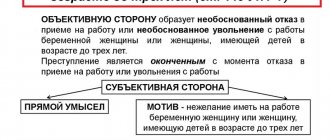Labor law in the Russian Federation, as in other countries, largely focuses on protecting the interests of the less protected party - the hired employee. It is almost impossible for an employer to fire a person without any reason other than his own intention. And then means are used to force the employee to agree to write a statement “of his own free will,” even if in fact he does not have such a desire.
In some situations, under such pressure, the application may be challenged and declared invalid. Let's look at the most common controversial situations related to forced dismissal and explain how you can protect yourself from this.
“Forced dismissal” in the language of law
The labor legislation of the Russian Federation provides a closed list of grounds on which an employer can dismiss an employee without his consent (Article 81 of the Labor Code of the Russian Federation). Mostly these are negative motives, reduction in numbers (staff) or liquidation of the organization itself. But often bosses, in flagrant violation of the Labor Code, force an unwanted employee to express his will to leave, supposedly “of his own free will”, “consent of the parties”, or falsify his statement.
Forcing dismissal is an employer’s actions aimed at influencing an employee to write a letter of resignation or draw up an agreement to terminate an employment contract.
Why, despite obvious unseemly behavior, do employers allow such actions? Because they are beneficial to them:
- you can quickly remove an unnecessary person from the staff;
- if you leave “at your own request” you will not have to pay severance pay or compensation;
- The team is shown a particular case of the use of superior power.
Ways to put pressure on an employee
An employer who plans to illegally fire an employee has a lot of “home preparations”. Threats of “dismissal under article”, bribery or use of administrative resources are used - with attempts to transfer to another (worse in all respects) position or unilaterally change the terms of the employment contract. There is only one positive point in all this. If blackmail, psychological pressure and threats are difficult to prove, then violations of labor laws are quite possible, since. And the employer will have to violate the provisions of the Labor Code if coercion through blackmail and threats has no effect. Therefore, the only right way for those who do not want to resign under pressure is to collect evidence of coercion and wait.
Popular methods of coercion
It is a rare tyrant boss who will invent something new in this area. Ways to “squeeze” a subordinate out of work are old and few in number, but, alas, quite effective:
- A request that cannot be refused. In most cases, the boss asks you to politely and convincingly write a letter of resignation. Or a threat may be used, even a physical one.
- “There is always something to be fired for.” If the answer to the request for self-care is negative, management may resort to blackmail: threaten that they will find a negative reason for dismissal at the initiative of the employer.
- "Extrusion." At work, at the instigation of superiors, an atmosphere of nagging and psychological discomfort is artificially created: public reprimands even for minor failures, disciplinary sanctions for the slightest violations of the routine, neglect of the right to promotion, deprivation of bonus payments, etc.
- “But the Code is not a decree for me.” The employer clearly neglects the rights of the employee: fines him, calls him to work overtime, delays, reduces or does not pay wages, etc.
IMPORTANT! If the inspection body catches the employer in one of these types of behavior, it is lawful to bring him to administrative responsibility for violating the requirements of the Labor Code of the Russian Federation.
Arbitrage practice
In modern conditions, as a result of changes in the relationship between contractual and state regulation of labor relations, more and more problems arise precisely on the basis of dismissal of one’s own free will. Unlike Soviet times, when the conditions of hired labor were regulated by government agencies, now the employee-employer relationship is more dependent on the agreement between these entities. As a result, disagreements arise, caused primarily by reforms in the economic sphere of the state.
Judicial practice is full of various cases of problems arising on this basis, which require different approaches to solution. As a consequence, this makes it difficult to choose the only correct solution to such situations.
Most often, an employee who has been subject to pressure doubts that his appeal to the court will yield a positive result, and prefers to simply change his place of work without seeking justice. From a professional point of view, it is also impossible to predict the likelihood of a court decision in favor of any of the parties.
Dismissal at free will is regulated by paragraph 3 of the first part of Article 77 of the Labor Code of the Russian Federation. This is a kind of guarantee that ensures that an employee can terminate an employment contract with an employer unilaterally due to objective or subjective reasons. This right is based on the fundamental principle of labor relations - the prohibition of forced labor, which is provided for by international legal acts and the Constitution of the Russian Federation in Art. 37. In the Labor Code this is stated in Art. 4.
Real examples from judicial practice show that in some cases it is quite difficult to prove the illegal actions of an employer towards a subordinate. However, this should not discredit the court in the eyes of defrauded workers and force them to abandon the idea of restoring justice.
In one of the situations, a court of general jurisdiction considered a case where a boss forced a subordinate, who had retired but did not stop working, to resign of his own free will. The negligent employer used psychological pressure, and also openly humiliated and insulted the employee, which can also be considered from the point of view of the law on the protection of honor and dignity. These offenses were confirmed by video recording made by a hidden camera.
In a court of general jurisdiction, in order to identify the fact of coercion, it is permissible to attach legally obtained video and audio recordings to the case for resolving a labor dispute. This is provided for in Art. 55 of the Code of Civil Procedure of the Russian Federation, from the provisions of which it follows that such information can serve as evidence in this case or have certain facts to speed up the resolution of the issue and clarify the information.
The court assessed the video recording provided, rejecting the arguments of the other side about the illegality of obtaining this evidence under Part 2 of Art. 55 Code of Civil Procedure of the Russian Federation. However, the representative of the injured party proved that the video recording, although it was made without warning to the employer, was not intended to collect incriminating evidence, but only to assist the plaintiff in preparing documents at the request of the employer himself. For this purpose, not only video, but also audio was recorded, which made it possible to coordinate his relationship with the employer. Consequently, these actions did not violate the current legislation and can claim weight in the consideration of this case.
By analogy with the previous case, the court considered the case of citizen L., who was dismissed of her own free will, for her reinstatement. The victim alleged that her boss forced her to sign a resignation letter, threatening to expel her son, who was studying at the same commercial higher educational institution where she was employed.
As evidence of this fact, testimony was provided from witnesses - her colleagues, who confirmed that this employer had forced employees to resign before. The rector of this university had a practice of regularly dismissing teachers in May-June and reinstating them at the beginning of the next academic year only taking into account the number of enrolled students.
In modern conditions, employers also use such pressure as non-payment of unofficial wages issued in an envelope, subject to resistance to voluntary dismissal within a specified period.
Considering that it is not always possible for an employee to provide convincing evidence that he was forced to resign, allegedly of his own free will, this creates certain obstacles in protecting the rights of an employee if they are violated.
Unfortunately, not all cases of forcing an employee to resign at his own request can be proven in a court of general jurisdiction, which prevents the proper protection of the employee’s rights in the event of their violation. It follows from this that a fairly small number of workers go to court to have their dismissal declared illegal.
Sometimes it's better to quit yourself
There are situations when forced dismissal is a benefit for the employee on the part of the employer. This may occur in cases where the alternative is dismissal under the article, especially with payments for the employee’s financial responsibility. Sometimes it is easier for an employer to quickly get rid of a guilty employee by allowing him to “save face” and not spoil the work book with unpleasant entries. Evidence of negative grounds for dismissal requires additional time and effort from the employer, as well as legally correct documentation.
In such cases, employees gratefully accept the offer to leave “of their own free will,” although this would also be forcing them to resign.
It's easier to force, it's hard to prove
Legal practice suggests that coercive employers often get away with impunity. There are several reasons for this:
- The offended party cannot prove duress. Often conversations about dismissal occur unexpectedly for an unwanted employee. As a rule, the employer makes sure that they take place without witnesses. Even if you press the record button on your phone in time, it will not be legal evidence for the court.
- Positive test result. If an organization receives an inspection from the prosecutor's office or labor inspectorate, this does not mean that it will be able to establish the fact of coercion, because it leaves no traces.
- The prosecutor's office will only “wag its finger.” Even if you complain to the prosecutor’s office and it takes the complaint seriously, all that it can do to the employer until the dismissal takes place is to issue a “warning” - simply a speculative measure that does not carry any legal consequences. A dismissal that has already taken place can only be challenged in court.
- “They didn’t know what they were doing.” Due to legal ignorance, many workers do not even realize that their rights are being violated.
ATTENTION! For more timid employees, the phrase “You are fired, write a statement!” is often enough. The image of an all-powerful boss is often shown in movies, so such a dismissal may seem legitimate to the average person.
Customer Reviews
Customer Feedback We thank the employees of Legal Agency of St. Petersburg LLC and, first of all, Yana Maksimovna Matveeva and Andrey Valerievich Ermakov for their highly qualified and thorough consideration of our issue and the prompt solution to our housing problem.
Also to Daria Valentivna Kutuzov for her attentive and friendly attitude towards visitors.
Gratitude from Soboleva E.P. I would like to express my deep gratitude to Vasily Anatolyevich Kavaliauskas for his literacy, consultation and attention to the client who found herself in a difficult situation; as well as wonderful, sensitive administrators. I wish the company prosperity and good clients.
Sincerely, Soboleva Elena Petrovna. September 19, 2018
Gratitude from gr. Tiuntsova G. A. I asked for advice from your “Legal Agency of St. Petersburg” - regarding deception by one person who presented himself as an employee of Rospotrebnadzor of the Krasnoselsky district, Novichkov A. A. Offered me a service - before the New Year, go on a tourist trade union voucher to Moscow on the Sapsan railway transport. I refused due to the manipulation of the placement of seats - in different trains, and then by car. Lawyer Sergei Vyacheslavovich Mavrichev handled this case and provided consultations. I thank you for such a sensitive and attentive attitude in office work, which was denied at the 58th police department of the Vyborg district, under Art. 24, 144, 145 of the Code of Criminal Procedure of the Russian Federation, I now have the right to appeal the conclusion and will send an application for further investigation to the district prosecutor's office.
Tiuntsov G. A.
8
Gratitude from gr. Voronova T.A. I express my gratitude to Yuri Vladimirovich for competent, highly professional advice on the issue of “Protection of Consumer Rights”, a clear explanation of my further actions in my situation, as well as gratitude to Olga Anatolyevna for her attentive and sensitive attitude towards visitors. I was glad to meet your agency!
Voronova Tatyana Anatolyevna
tel.
Gratitude from N.S. Khokhlov I am Khokhlov N.S. I express special gratitude to lawyer A.V. Pavlyuchenko who defended my consumer protection rights. I was pleasantly surprised by his professionalism, where he discovered the false address of my defendant registered in the Unified State Register of Legal Entities, and also defended me, as I believe, from the unreasonable decisions of the trial judge. If I need legal assistance in the future, I will only turn to A.V. Pavlyuchenko.
N.S. Khokhlov December 12, 2017
Gratitude from Piskunov I.B. I just don’t have words to express my gratitude to Sergei Vyacheslavovich. Thank you for having such a lawyer. Thank you for your help regarding the issue regarding the employment contract.
Piskunov I.B. 12/12/2018
Thanks to Pavlyuchenko A.V. from Astafieva A.S. I express my gratitude to the Legal Agency and in particular to lawyer Alexander Viktorovich Pavlyuchenko for the work done, high qualifications and high-quality approach. Thanks to Alexander Viktorovich, we managed to achieve a result in court in a case on the protection of consumer rights that I did not even expect. The amount recovered in court even exceeded my expectations. Thank you very much for your qualified work and professionalism.
Sincerely, Astafieva A.S., 03/01/2019
Thanks to Mavrichev S.V. from Bars Dan A. I thank the wonderful Lawyer Sergei Vyacheslavovich Mavrichev for thorough, competent advice and human mutual assistance to all his clients who are in deep need of qualified and timely legal and psychological advice.
Leopard Dana A. 09/18/2018
Gratitude from Remedova A.G. I express my gratitude to the Legal Agency of St. Petersburg, namely Denis Yuryevich Stepanov, for the assistance provided in resolving my issue, and I also express my gratitude to the entire team of the consumer rights protection society for their responsiveness and pleasant communication.
Remedova A.G. 08/17/2018
Gratitude from Kikkas V.P. Kikkas V.P. I am grateful to the Legal Agency of St. Petersburg for understanding the situation and timely assistance in my seemingly hopeless situation, personally to Denis Yuryevich Stepanov, I hope to continue to cooperate.
Kikkas V.P. 08.11.2018
What is the penalty for coercion?
If, nevertheless, the employer’s guilt is proven, the law provides for the following administrative liability for him (under Article 5.27 of the Code of Administrative Offenses of the Russian Federation):
- fine 1000 – 5000 rubles;
- disqualification for up to 3 years;
- reinstatement of the unfairly dismissed;
- payment of money for forced downtime;
- compensation ordered by the court.
If a pregnant woman was forced to leave and this can be proven, the liability becomes criminal (Article 45 of the Criminal Code of the Russian Federation): according to it, the guilty manager faces compulsory labor, and his company faces suspension of activities.
What to do if you are forced to leave
The first thing to decide in such cases is whether you really need the job. If they so clearly don’t want to see you there, is it worth spending precious time and effort on this workplace? If you are ready to give in, we can recommend protecting your interests as much as possible:
- resolve issues with the employer regarding the period and conditions of voluntary resignation;
- write a statement not of your own free will, but by agreement of the parties, stipulating the payment of severance pay and compensation.
If the decision is made to fight, then the advice will be as follows:
- voice your position to the employer: you know that they want you to “survive”, but you do not intend to give up;
- under no circumstances write or sign any documents about dismissal; make it a rule to carefully read all signed documents;
- scrupulously observe labor discipline and internal regulations;
- record all controversial issues in writing;
- do not give in to provocations;
- be prepared for unpleasant surprises (for example, not being allowed to work due to a medical examination not completed on time, an overly biased safety check, a truant taking time off that was formalized only in words, etc.).
What will serve as evidence of coercion?
You can sue an employer within a month from the date of dismissal. Not everything can serve as evidence in court. If you intend to sue your employer, you will have to take care of the evidence base:
- maximum documentation (for example, if you need time off, you should not rely on verbal permission, but submit a written request and receive it);
- video and audio recordings (their authenticity must be proven);
- witness statements.
FOR YOUR INFORMATION! The only almost indisputable evidence of forced resignation is the hiring of another employee on the day the plaintiff wrote the application: with a “real” dismissal in such a short period of time, it is unlikely that the right specialist will be found.
What to do if the employer is against the contract by agreement of the parties?
It happens that the manager stands his ground and does not want to hear about any agreement between the parties. In this case, he will have to deal with the labor inspectorate. After contacting this service, it must conduct a check on the employer.

“If these actions did not lead to anything, it is necessary to write a corresponding statement to the prosecutor’s office. If appealing to the help of the “eye of the sovereign” does not bring results, the employee must prepare to defend his interests in court. For this purpose, it is important to ensure the availability of an evidence base in advance,” points out








